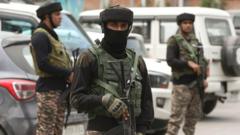India's attempt to stall a $1 billion IMF bailout for Pakistan amidst rising tensions reflects its limited influence in international financial platforms and highlights systemic issues within such institutions.
Why India's Efforts to Block IMF Loan to Pakistan Fell Short

Why India's Efforts to Block IMF Loan to Pakistan Fell Short
India's diplomatic pressure on the IMF over a bailout for Pakistan reveals complex geopolitical challenges.
Last week, the International Monetary Fund (IMF) approved a $1 billion (£756 million) bailout for Pakistan, igniting sharp criticism from India as military tensions between the two nuclear countries escalated. Despite India's vocal protests, the IMF board ratified the second tranche of a $7 billion loan, asserting that Pakistan's implementation of its economic recovery program had made significant progress. The fund emphasized its commitment to aid Islamabad in enhancing its resilience against climate change and potential natural disasters, paving the way for an additional $1.4 billion in future assistance.
India reacted to the decision with strong objections, expressing concern over the effectiveness of such financial assistance given Pakistan's historical difficulties in implementing necessary reforms. More importantly, India raised alarming suspicions regarding the potential misuse of these funds for activities associated with “state-sponsored cross-border terrorism,” allegations that Islamabad has consistently refuted. India accused the IMF of risking its reputation and compromising global integrity through this support.
Even some Pakistani analysts acknowledge India’s concerns about Pakistan’s history of recurrently seeking IMF bailouts—24 times since 1958—without making substantive reforms to enhance governance. Hussain Haqqani, a former Pakistani ambassador to the US, likened the IMF to an intensive care unit (ICU); frequent visits signal deeper systemic issues rather than an urgent fix.
India's clout in the IMF is constrained as one of 25 board members, representing a coalition with Sri Lanka, Bangladesh, and Bhutan. In contrast, Pakistan is part of a different group alongside Iran. IMF decisions are predominantly influenced by economic size and financial contributions, leading to criticism that this model favors wealthier nations at the expense of developing countries.
For instance, the US wields the largest voting share at 16.49%, while India's representation stands at a mere 2.6%. Furthermore, IMF protocols do not permit opposition votes against proposals, only allowing members to either support a motion or abstain, emphasizing the complexities behind consensus-based decision-making.
The need to reform the IMF’s voting dynamics, particularly during India’s G20 presidency, gained traction. Former officials like NK Singh and Lawrence Summers proposed disassociating voting rights from financial contributions to foster better representation from both the Global North and South. However, no advancements have yet materialized regarding these reforms.
Adding to the complexity, recent IMF policy changes enable loans to nations embroiled in conflict, exemplified by the unprecedented $15.6 billion assistance to Ukraine in 2023. This shift suggests that the IMF cannot refuse pre-arranged loans to Pakistan by invoking wartime rules.
To effectively address these grievances, experts suggest that India should focus on platforms like the Financial Action Task Force (FATF), which assesses countries' compliance with counter-terrorism financing measures. Previously, countries on the FATF grey list faced challenges in securing IMF loans, a precedent that applied to Pakistan prior to its removal from the list in 2022.
Some analysts caution that India's advocacy for a revised IMF funding structure could inadvertently empower Beijing, rather than New Delhi. Historical instances where India has faced vetoes from China in multilateral forums raise concerns about such tactics potentially backfiring.
Overall, while India's rhetoric against the IMF bailout may resonate domestically, it appears ineffective at the international level, reflecting deeper geopolitical and systemic challenges that extend beyond mere financial assistance.





















